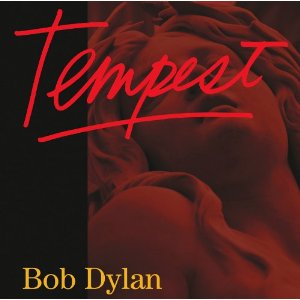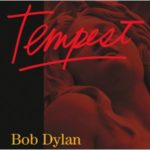
Bob Dylan Tempest (Columbia)
Patterson Hood Heat Lightning Rumbles In The Distance (ATO Records)
Will Johnson Scorpion (Undertow Music/Thirty Tigers)
Being the opening act for a legend isn’t a bad spot to be in. Granted, there are folks who won’t aim to arrive at the venue until the headliner hits the stage – but there will still be a chunk of the audience on hand for the opener to play to, making a connection that might not otherwise happen.
But sharing an album release date with a legend is another thing. Most forms of media will be focused on the big name; the web will be peppered with leaks and streams; even the windows of the local record shop will be plastered with posters touting the great’s latest.
Imagine sharing a release date with Bob Dylan, for instance. Just think about it …
Right.
There are 52 weeks in a year – and with years between brand-new Dylan studio releases … well … what are the odds?
I’m not a gambling man, but I am willing to bet that neither Drive-By Trucker Patterson Hood nor Centro-matic’s Will Johnson purposely picked the 11th of September for their latest solo albums to drop, knowing that Mr. Dylan’s Tempest was going to hit the streets that very same day. More likely, the announcement of the release date for Tempest was an “Oh, shit” moment for the Hood and Johnson camps. Maybe not … but rightfully so if it was.
The point of all this is, Will Johnson’s Scorpion and Patterson Hood’s Heat Lightning Rumbles In The Distance are two examples of very fine albums that also touched down among all the celebration of the landing of Tempest this week. Sure – dedicated followers of Hood and Johnson’s music have been waiting for their albums to arrive and wouldn’t be deterred; but it is surely difficult to grab new eyes and ears amongst the roar of Tempest. (And don’t get me wrong: this isn’t an anti- Tempest essay – it’s simply an acknowledgment of Hood and Johnson’s talents.)
The three are artists of differing approaches. Johnson is the painter: his songs on Scorpion are made from canvases covered in brushfuls of primary colors/emotions, then treated to splashes/feathers/daubs/dots of accents both subtle and bold. Patterson Hood is the sort of soul who touts himself a basic carpenter but is in fact a true wood artisan. Heat Lightning Rumbles In The Distance is built from materials/words that are readily at hand to all of us; Hood knows how to shape and fit them to create scenes and feelings that are all too familiar. And Dylan is the sculptor, his Tempest tunes chiseled from age-old shapes of American music, made into forms of his own design.
A read-thru of the liner notes for Scorpion reveals it to be very much a Will Johnson solo album: any and all guitar parts you hear are his, along with piano, synth, drums, various percussion, and vocals. Centro-matic bandmates Scott Danbom and Matt Pence are on hand: Danbom contributes passages of lovely violin while Pence manned the board in his home studio to capture Johnson’s five-day burst of creativity. Okkervil River’s Howard Draper guests on banjo and organ, while Magnolia Electric Company’s Mikey Kapinus sits in with his saw. (Don’t laugh: my Old Man could play the saw. You have never heard anything so eerie and beautiful at the same time.)
In many ways, Matt Pence is the co-star of Scorpion. His Echolab is the ideal setting for Johnson’s ten tunes, making for a warm vibe where the levels feel like they were controlled by how far the player leaned forward in their chair. For instance, the acoustic guitars sound big – not the wallop of a big jumbo body, but the almost-blushing intimacy of a well-recorded parlor guitar. (You could plaster various forms of the word “intimate” all over a review of Scorpion – I’ll try to refrain from doing it.) The overall sound that Pence created is more hollow than dry; the mood is definitely shades-drawn-on-a-cloudy-day – woodstove weather.
Johnson’s use of words is always interesting. Every one counts, yet you can listen to his songs from a distance, relishing his shaping of syllables to create ghost-like melodies. “Breathe, allow, release/Sing a newer hymn/For newer days/My homeward son” he sings as “Bloodkin Push (Forget The Ones)” softly drifts into its first verse. The fact of the matter is, if you didn’t know what Johnson was singing, the feeling intended is still as clear as a bell. The longest cut on the album at just shy of seven minutes, “Bloodkin Push” makes its way (led by Johnson’s acoustic guitar) from gentle comfort to uneasy dissonance – and just when all seems lost, Johnson reaches out and brings you back by the fire. The same thing is accomplished in just a few seconds on “Riding From Within”: the arpeggioed opening chord takes a dark twist before the hand makes a full pass; Danbom’s violin and Draper’s banjo swirl around the perimeter, adding further layers of unsettledness; and then the vocal glides in and soothes.
“Rosanky” is a hybrid of John Lee Hooker groove and Appalachian stomp – as immediate as the back porch; as deep and dark as an old well on a winter’s night. “It Goes Away So Fast” begins with that same sort of weather-beaten-wood-framed soul before evolving into a multi-textured other-worldly groove, reeking of hot tubes.
Scorpion is moody, pensive, and chock full of honest beauty – think of Neil Young’s visit to the ditch without the ragged edges. These are not songs that you’ll necessarily be humming to yourself after the first listen, but the emotions they stir up will stick with you, for sure.
Johnson’s mastery of the sonic paintbrush is no doubt one of the many reasons that Patterson Hood seeks him out for collaborations. On Hood’s new Heat Lightning Rumbles In The Distance Johnson guests on several songs, adding “atmospherical vocalizings” and equally spacey/lovely applications of “Silvertone electric guitar.”
While we’re making Neil Young analogies, here’s Heat Lightning in a nutshell: Patterson Hood has made his Harvest. There’s crunch without roar; there’s love, loss, and reflection; there’s even a bit of Mike Cooley-picked banjo (“Leaving Time”) that can’t help but make you think of when ol’ Neil talked James Taylor into picking up a banjo for “Old Man”.
Although “12:01” (a reference to a blue law loophole allowing the midnight-to-AM sale of booze on Mondays) is officially the first track, it feels like Heat Lightning Rumbles In The Distance really begins with “Leaving Time” and comes full-circle with “Fifteen Days (Leaving Time Again)”. The former deals with the family’s feelings as Daddy gets ready to get on the band bus (“The baby’s on the bedroom floor/Suitcases and clothes galore/Everyone’s just a little bit sore/When it comes to leaving time”). Scott Danbom is on hand here to provide just-right bits of piano and bittersweet fiddle. And “Fifteen Days” finds the hero returning (“Lock the door/Throw away the phone”) and trying to make up for lost time – until he needs to go back out on the road again.
In between, Hood offers up a selection of well-crafted tunes delivered in a setting that feels like a series of letters from an old friend. You can thank longtime Hood/DBT collaborator David Barbe for Heat Lightning ‘s vibe: he co-produced with Hood, working his now-standard studio magic at Athens, GA’s Chase Park Transduction.
Barbe (who stepped in for a string of gigs when longtime Trucker bassist Shonna Tucker left the band last December) also shares bass duties on Heat Lightning with Patterson’s father David Hood. The contrast between David Hood – a Muscle Shoals vet from way back – and David Barbe is interesting: Barbe tends to play understated lines that are fueled by a given song’s mood; Hood latches onto a tune’s groove like a big ol’ bulldog and never lets go. Each one is perfect for the songs they play on.
There are songs that are nothing but classic Patterson Hood: “Better Off Without” is a whole bunch of self-reassurances over top of a D-tuned Gibson (and one of those aforementioned Daddy David killer bass lines); “Fifteen Days” is propelled by a chuk-chukka-chuk hand-muted rhythm guitar with plenty of reverb afterglow; and “Betty Ford” eases in with a tension-filled bit of guitar by Hood before exploding with Brad Morgan’s drums and Jay Gonzalez’ keys.
And there are plenty of unexpected moments as well: Hood carries “Disappear” with a borrowed mandocello (he wrote the song on the thing the first day that he held it). “(untold pretties)” is a spoken piece – honest reflections on the death of a loved one and a marriage that was doomed before it started. The premise may sound grim, but Hood’s words are full of stark, beautiful pictures. And in the end, there is wisdom shared: Hood describes a “personal hell that followed me around for a while. But didn’t anymore.”
The turning point? “You can only carry hell around so long before it gets to be a drag.” Remember that, folks.
Overall, Heat Lightning Rumbles In The Distance is yet another example of Patterson Hood’s ability to provide the voice of everyman’s rock ‘n’ roll soul. And, playing devil’s advocate here, let me ask: when’s the last time Bob Dylan wrote a song that made you feel like he was talking about you ?
Which is okay: Mr. Dylan has provided enough anthems, slogans, mantras, and tattoo-worthy quotes to last until the end of time, truth be known. If you’re cool with the Spokesman For A Generation simply being Good Ol’ Uncle Bob The Entertainer, then you’re going to find Tempest a hoot.
The thump-a-wump bluesabilly romp of “Duquesne Whistle” (written with Robert Hunter) kicks things off: bassist Tony Garnier has his hand on the throttle, driving the beast down the track; Dylan belts it out like Louis Armstrong; everybody’s having a good time. Speaking of having fun, dig guest Lobo David Hidalgo’s raunchy accordion honking out the modified “Mannish Boy” grease of “Early Roman Kings”. Or how about the fiddle and guitar butt-bumping their way through “Narrow Way”? There’s no break-loose solo on anybody’s part, but the groove’s so cool you’ll never notice.
Multi-instrumentalist Donnie Herron is all over Tempest, laying sweet pedal steel down behind Dylan’s sentimental growl on “Soon After Midnight”, providing almost-creepy tension with his banjo picking on “Scarlet Town”, and laying a comforting arm around Dylan’s words on “Roll On John”, a tribute to fallen buddy John Lennon. (Bob’s feelings are real; what is also real is we’re witnessing the mourning of a god by a god, 30-plus years on.)
The much-ballyhooed title track is a nearly 14-minute stroll around the deck of the doomed Titanic. Dylan weaves fact, fiction, and pulp culture (yes, it’s true: even Leonardo DiCaprio is tucked into the song’s 45 verses) together in the course of his grim narration; the band holds fast in a waltz behind him for “Tempest”’s duration. The true touch o’ Bob is the watchman who appears throughout the song, lying on the deck asleep.
So there it is: Tempest is a fine addition to your Dylan collection, boys and girls – although if you don’t have a collection, you’d be better off to go back 50 years or so and start from there.
In the meanwhile, take the time to look beyond the massive shadow cast by Tempest and seek out the talents of Patterson Hood and Will Johnson.
They’re speaking your language.



No Comments comments associated with this post